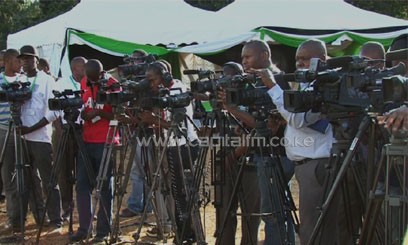
Editors Guild Vice Chairman David Ohito termed the fines of up to Sh20 million for media houses as absurd, saying they will lead to the closure of small firms/FILE
Editors Guild Vice Chairman David Ohito termed the fines of up to Sh20 million for media houses as absurd, saying they will lead to the closure of small firms.
“Kenyan media is being prepared for the big conglomerate media houses only. Smaller stations who are the majority cannot survive the punitive fines that are demanded in the Bill,” Ohito protested.
“By passing the Bill it will prove fatal for the stations as they cannot pay the fines hence they will have to close shop,” he explained.
He added that the contents of this Bill are an affront to freedom of expression not only with respect to the media fraternity but to all Kenyans.
“From the look of things, the National Assembly has chosen to misuse its legislative powers to re-introduce draconian laws meant to gag the media and muzzle all critical voices that seek to hold power to account,” he said.
Ohito said media practitioners will not allow the National Assembly to flout the Constitution unchallenged.
Chairman of the Correspondents Association Oloo Janak echoed Ohito saying County Assemblies were also creating harsh laws for journalists that are not locals of the area in a bid to discourage them.
Janak explained that this was creating a hostile environment for journalists and will also see a failure in all efforts geared towards the establishment of growth at the counties.
“The counties are going to implement the laws stipulated in the Bill by creating harsh laws within the counties for the journalists at the county level.”
“As correspondents we have already started seeing the effects as some county assembly officials are even dictating for journalists what they can wear,” explained Janak.
The media practitioners further denied their involvement in the drafting of the Bill saying that the clauses were changed from the recommendations made during their consultative meetings with the Ministry.
The International Press Institute also raised concern about the proposed law that was approved by the National Assembly on Thursday, saying that the restrictive fines would give the government control over who can practice journalism.
In a statement Executive Director Alison McKenzie said, “It is inconceivable that a country standing so firmly on democracy and modernity would pass such a backward media law.”
“We implore the President not to sign the Bill which violates portions of Kenya’s Constitution, when it reaches his desk and to engage with the media community instead in strengthening self regulatory mechanisms.”
The Kenya Information and Communications (Amendment) Bill 2013 also known as the Media Bill will see individual journalists and media houses violating the code of conduct face dire consequences.
The Bill which now awaits Presidential Assent for it to become law will also see the creation of a powerful Communications and Multimedia Appeals Tribunal to address media complaints as opposed to the current situation where grievances are addressed through the Media Council of Kenya.
A Journalist found to have violated any information-related law will be liable to pay a fine of over Sh 1 million with the affected media house paying 20 million shillings.
The tribunal has sweeping powers to even attach property of individual journalists and media houses.
It can also “make any supplementary or subsidiary orders or directions that it may consider necessary.








































